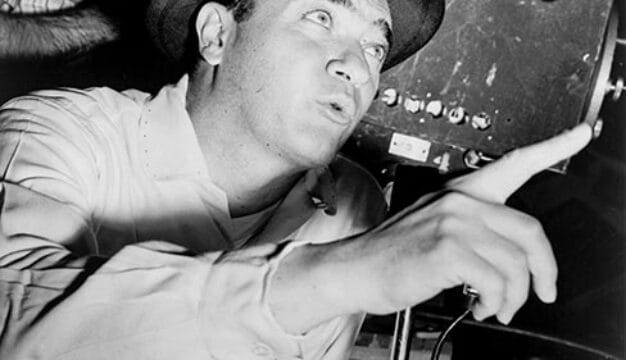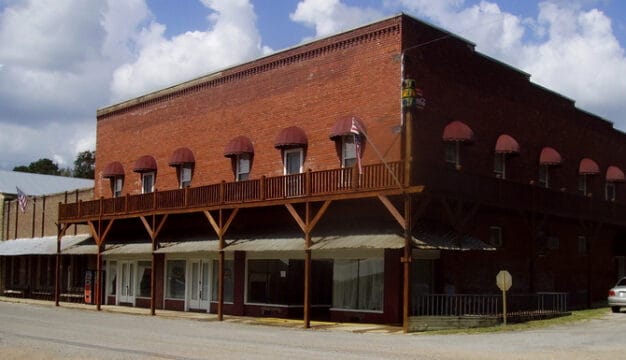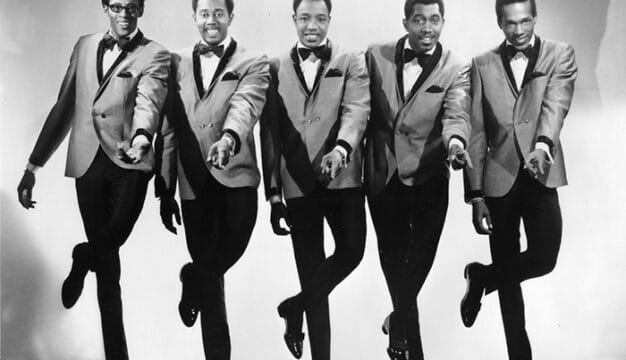Red Door Theatre
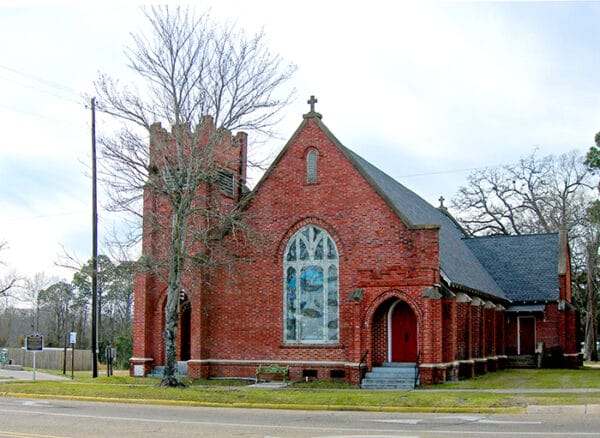 The Red Door Theatre
The Red Door Theatre is a professional theater company headquartered in the former Trinity Episcopal Church in Union Springs, Bullock County. The organization is named for the church’s red doors. Trinity Episcopal was constructed in 1909 and is a contributing property to the Bullock County Courthouse Historic District. Since its founding in the early 2000s, the theater has been instrumental in bringing tourists to Bullock County.
The Red Door Theatre
The Red Door Theatre is a professional theater company headquartered in the former Trinity Episcopal Church in Union Springs, Bullock County. The organization is named for the church’s red doors. Trinity Episcopal was constructed in 1909 and is a contributing property to the Bullock County Courthouse Historic District. Since its founding in the early 2000s, the theater has been instrumental in bringing tourists to Bullock County.
The one-story, red brick, Gothic Revival church was designed by a local high school senior, Richard Kennon Perry, who went on to become a professional architect. The lot was provided by the Foster family. The building has German stained glass windows, Gothic arches, an end-gable structure, and an attached bell tower. The church was finished in 1909, and its marble cornerstone was engraved with the year of completion and dedication. It is part of the larger Bullock County Historic District, which was added to the National Register of Historic Places in 1976. The district encompasses 47 buildings that include the Bullock County Courthouse, the Bullock County jail, the Carnegie Library, and many commercial buildings from the late nineteenth century and early twentieth century.
In 1872, the Rev. DeBerniere Waddel formed a parish as part of the Alabama Diocese of the Episcopal Church, with 17 communicants and an annual budget of $412.50. Until 1879, the congregation held monthly services at the county courthouse or in other churches. In 1879, the congregation purchased a small wooden building across the street from the location of the present church and held services there while the present church was being built. A number of Confederate soldiers were buried on the site of Trinity Episcopal. When the church was being constructed, most of the graves were moved to make room for the church, but Frank Butterfield, a member of the Company B of the Twenty-third Alabama Regiment, was not moved, as his family decided his grave should be kept there. His body still lies under the building, and there is a marker in the floor of the former sanctuary where the theatrical performances are held, but it is generally covered by carpet. There is speculation that Milton Butterfield, brother of Frank, is also buried under the church and remains there as well. There have been inaccurate legends that the creator of the bugle call “Taps,” made popular during the Civil War, is buried under the building. But the Union brigadier general who created the call, Daniel Butterfield, is buried at West Point Cemetery at the U.S. Military Academy in New York.
The genesis for the theater was in 2001 when the Tourism Council of Bullock County started forming a plan for a theatre in the county to boost tourism. The then-empty Trinity Episcopal Church was de-sanctified in 2002, and the Episcopal Diocese of Alabama sold the church to the city of Union Springs, trading vacant land donated by local businessmen for the vacant church building. The church building was then leased to the Tourism Council, which also oversees the theater.
The first and longest-running work performed at the new Red Door Theatre was Conecuh People: Words of Life from the Alabama Black Belt. It was presented in 2004 and ran until 2010. It was a series of monologues based on interviews of Black Belt residents conducted by Union Springs native Wade Hall, who was a prolific author on Alabama and the American South. Playwright Ty Adams, from nearby Clayton, Barbour County, adapted Conecuh People for production in the former sanctuary. The popularity of the production prompted other cultural works, including a quilt experience in the town’s Carnegie Library, an exhibit of local artists’ work at City Hall, a seated dinner at the First Baptist Church, and a tour of a historic log cabin built around 1850. A local hunting lodge also started providing overnight accommodations for visitors, as well.
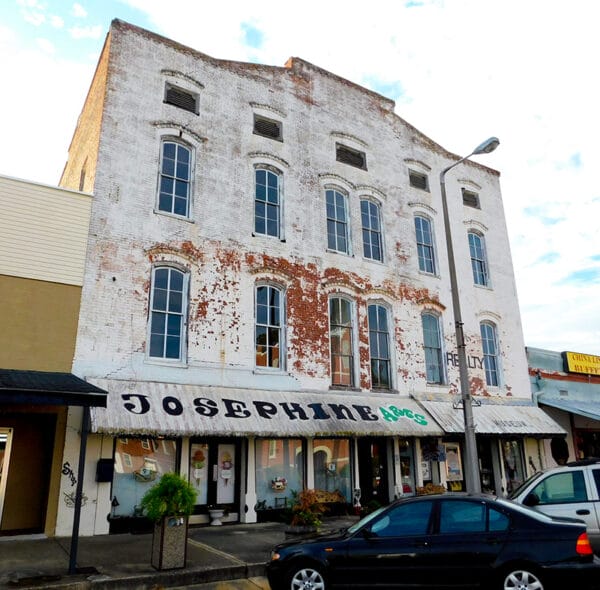 Josephine Hotel
The theatre has since staged a variety of productions, including plays about Alabama natives Nat “King” Cole and Hank Williams and Steel Magnolias, based on the play written by Dothan, Houston County, native Robert Harling. The theater’s season runs throughout the year and typically includes four plays, with themes centering on southern life that celebrate the heritage of the region. The theater is maintained and run by volunteer workers. It also hosts summer camps for developing acting skills as well as production skills for older campers.
Josephine Hotel
The theatre has since staged a variety of productions, including plays about Alabama natives Nat “King” Cole and Hank Williams and Steel Magnolias, based on the play written by Dothan, Houston County, native Robert Harling. The theater’s season runs throughout the year and typically includes four plays, with themes centering on southern life that celebrate the heritage of the region. The theater is maintained and run by volunteer workers. It also hosts summer camps for developing acting skills as well as production skills for older campers.
The theater is located at 101 North Prairie St. On the same block are the Union Springs Library housed in a 1911 Carnegie Library and the First Baptist Church that was constructed in 1860. Nearby are the Second Empire-style Courthouse (ca. 1871), the Moorish Revival Foster House (ca. 1854) that was added to the NRHP in 1998, and the Josephine Arts Center, which is located in the former Josephine Hotel built circa 1880-1890. Just south of Union Springs is Sardis Baptist Church that was founded in 1837, though the current Greek Revival chapel was constructed in 1850 and was listed on the NRHP in 2001.
